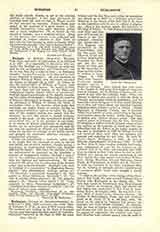

Burleigh, or BURLEY (BURLAEUS), WALTER, Friar Minor and medieval philosopher, b. in 1275 and d. in 1337. It is impossible to determine with certainty that Burleigh was a Franciscan, as some say that he was an Augustinian; and Franciscans “can do no less than lay a claim to him”, as Parkinson remarks, “leaving the matter to be disputed by such as are disposed to contend”. He was preceptor to Edward, Prince of Wales, who afterwards ascended the throne as Edward III in 1327. At Oxford he was the school-fellow of William of Occam, both being disciples of Duns Scotus. He taught at Paris for some time and was known as the Plain and Perspicuous Doctor (Doctor planus et perspicuus). Burleigh figured prominently in the dispute concerning the nature of universals. Following the doctrine of Scotus in this regard, he became, on the one hand, the adversary of William of Occam, the father of nominalism—that is, the doctrine which holds that universals are empty words, or nomina, having no real existence whatever; and on the other, the opponent of the extreme realists who taught that the universal, as such, has actual or formal existence outside of the mind. In this connection it should be remembered that, as in the question of universals, so in others of greater importance in philosophy, Scotus can be understood and interpreted only by one who has mastered by diligent and well-directed study the peculiar terminology of the Subtle Doctor and grasped his sometimes abstruse concepts’ of metaphysical principles.
Scotus was undoubtedly a moderate realist, that is, he taught that the universals in actu, to use his own words, non est nisi in intellectu, though having a foundation in extra-mental reality; and Burleigh followed his master. But when the disciples of Scotus endeavored to construct on his principles a doctrine of exaggerated realism, Burleigh’s opposition to this mistaken interpretation of Scotus doctrine was vigorous and uncompromising. He then, at least in this point, was the adversary of the Scotists rather than of Scotus himself. Burleigh’s only work on theology is a commentary “in Magistrum Sententiarum”. His philosophical writings include (I) “De intentione et remissione formarum”; (2) “Expositio in libros Ethicorum Aristotelis”; (3) “De vitis et moribus philosophorum”; (4) “De potentiis animas”; (5) “Summa totius logicae”; (6) “Commentaria in libros Posteriorum Aristotelis”; (7) “Tractatus de materi, et forma et relativis”; (8) “De fluxu et refluxu maris anglicani”.
STEPHEN M. DONOVAN

